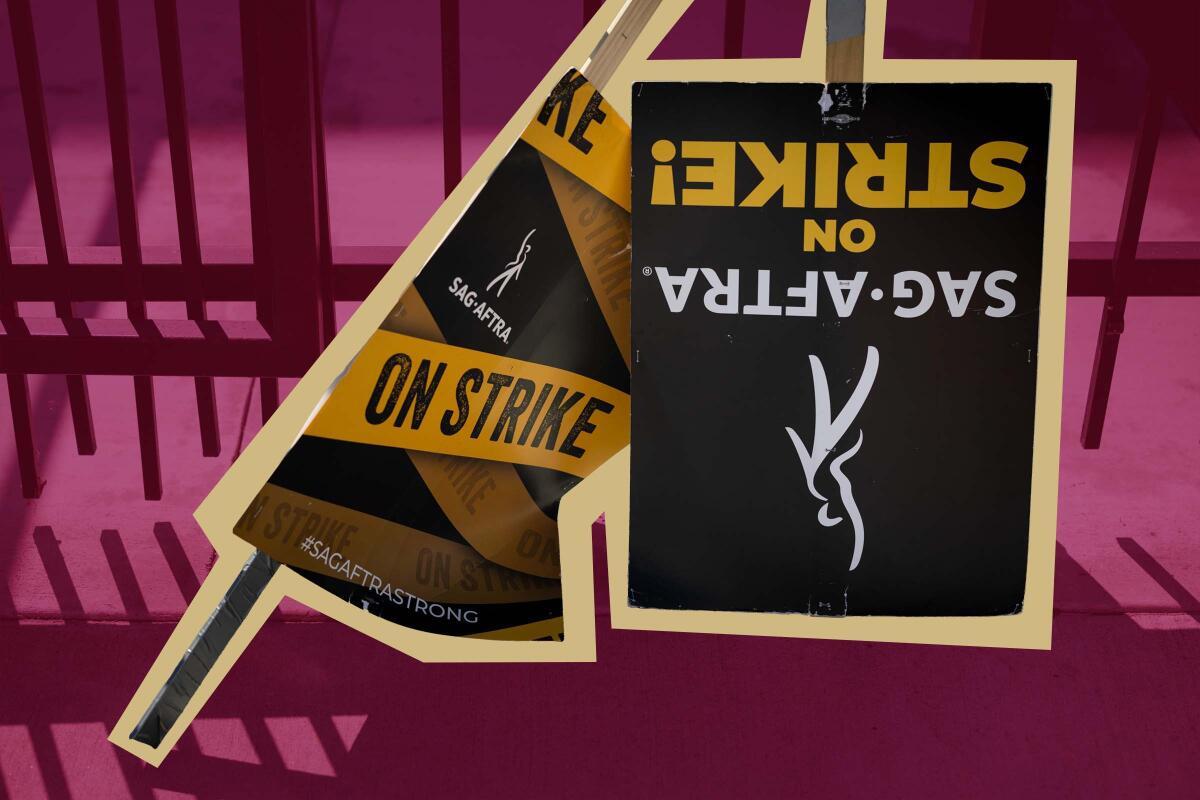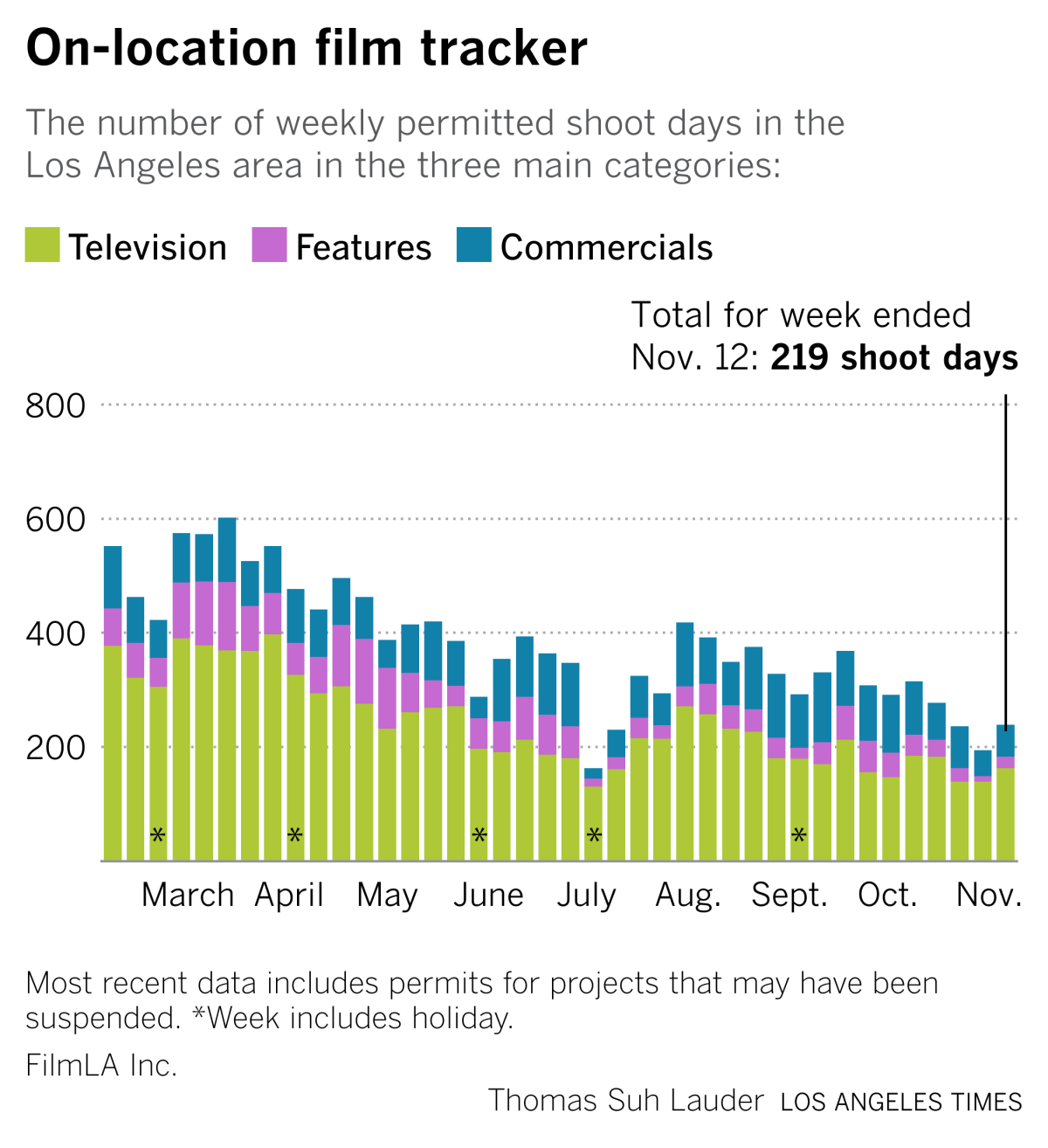AI, raises and streaming bonuses: What the SAG-AFTRA deal does and doesn’t accomplish

- Share via
Just hours before the actors’ strike ended last week, comedian and strike captain Elyssa Phillips spoke to The Times’ Christi Carras for my colleagues’ story examining the state of the industry six months after picket lines first formed in front of the major studios.
“There’s only a handful of actors that get to go back to work when all of this is over,” said the “Silicon Valley” and “Fresh Off the Boat” performer during a break between picketing and waiting tables. “Everyone just goes back to auditioning and back to their normal lives. The people who wait tables will still be waiting tables.”
You’re reading the Wide Shot newsletter
Ryan Faughnder delivers the latest news, analysis and insights on everything from streaming wars to production. Sign up to get it in your inbox every Tuesday.
You may occasionally receive promotional content from the Los Angeles Times.
But, she added, “I’ve never been so excited to audition in my entire life.”
What I love about that quote is how it honestly assesses the situation for the nonfamous, workaday actor striving for a standard middle-class existence, the type of people SAG-AFTRA leaders have said they’ve been fighting for all along during the union’s 118-day walkout.
Many actors, who’ve always relied on side hustles and day jobs to get by, had much to gain by going out on strike. A large number of them certainly had little to lose.
For studios, on the other hand, everything was at stake. By allowing the production pause to drag on further, the companies risked scuttling their entire scripted TV season and the bulk of the 2024 summer movie slate.
SAG-AFTRA’s 160,000 members now will have the chance to vote on whether to ratify the tentative agreement reached last week with the Alliance of Motion Picture and Television Producers. So what did guild President Fran Drescher and Chief Negotiator Duncan Crabtree-Ireland win for their rank-and-file?
The deal’s gains, summarized in an 18-page document published by the union, include increases in guild minimum payments (7% in the first year of the contract, compared with the guild’s demand of 11% as of mid-July when the actors’ strike began), boosts in residuals, a new performance-based bonus system for streaming and protections from artificial intelligence.
It’s widely expected that the deal will be ratified by membership, after 86% of the guild’s national board of directors approved the three-year pact. That’s despite objections by some members, including Justine Bateman, who say the AI protections don’t go far enough. Language governing the use of generative AI was a major sticking point during the final stages of talks.
The details of the AI agreement are complicated (here’s Carras’ summary, for more detail), but here’s the gist of it. The contract imposes serious restrictions on the use of two types of artificial intelligence creations: digital replicas of an actor made during the course of the performer’s work on a motion picture under the contract, and those made independently.
A studio needs the actor’s consent before creating an AI copy, and the performer must be paid for their work in making it.
As far as how the digital likeness can be used, the studios must get permission (“unless the photography or sound track remains substantially as scripted, performed and/or recorded”), and that consent has to be “clear and conspicuous” and be based on “reasonably specific description of the intended use,” according to the contract lingo. If the performer in question is dead, the studio must clear it with a representative or with the union.
Crucially, if a studio uses the actor’s likeness in a project, the company still has to pay their daily rate as if they had performed the scenes in person, a provision clearly aimed at producers trying to save money by replacing real people with AI clones.
The big carve-out here is that the pay protections won’t apply for Schedule F performers — actors who earn more than the minimum for series regulars and features.
The agreement also addresses the use of “synthetic performers,” which are AI creations that aren’t a replica of a specific actor. The contract holds that companies will notify the union and “bargain in good faith” if they want to use a synthetic creation instead of a human performer.
The success-based streaming payout system is similar to the one established by the recent Writers Guild of America settlement, but it differs in key ways. SAG-AFTRA uses the same benchmark of success as the WGA: 20% of a streamer’s domestic users watching the show or movie within 90 days of release, with a “view” calculated based on the amount of time watched divided by the length of the program.
However, SAG-AFTRA’s bonus will be equal to 100% of the actors’ existing fixed streaming residual, whereas the WGA’s is 50%. Of that new SAG money, 75% goes to the performers who appeared in the successful show or movie, while the remaining 25% goes into a fund to compensate performers in streaming shows who didn’t make the 20% cutoff, by a method to be determined by the fund’s trustees.
As with the WGA agreement, it will be a while before anyone can reasonably determine just how well the guild’s efforts paid off for its members.
Acting is still an uncertain, unstable profession. Those who pursue it take big personal, financial and emotional gambles. Of course this deal doesn’t change that. If anything, the business probably will get harder. Studios are pulling back, as they were before the strikes. Peak TV appears to be over. And who knows what theatrical film is going to look like a year or two from now, once companies figure out their movie strategies and risk appetites.
The point of a union contract isn’t to save Hollywood from itself. It’s not to guarantee a chicken for every pot and three auditions for every Gene Cousineau acting student, either. But for those who are able to get in the door, perhaps these gains can help make a career more sustainable. That should be the test.
Got feedback about this newsletter? Send me an email at ryan.faughnder@latimes.com.
Stuff we wrote
How the JFK assassination changed TV news and the journalists who covered it 60 years ago. Coverage of the Kennedy assassination 60 years ago changed the course of TV news and shaped the careers of some of America’s best known journalists.
Big checks and political galas: Hollywood donations expected to spike due to strike ending. Political donations from the entertainment industry, a backbone of Democratic politics, dried up during the Hollywood strikes. The floodgates are now expected to open.
Behind the making of newest ‘Call of Duty’ game: Getting the costumes right. Developed by California-based Sledgehammer Games, “Call of Duty: Modern Warfare 3” required intensive costume preparation to bring military outfits to the screen.
Can’t drive a block without seeing a Yaamava’ billboard? Inside the casino’s big bet on music. Casinos have long been a reliable paycheck for touring musicians, but Yaamava’ Resort has upped the stakes by spending millions on A-list acts like Ed Sheeran.
Disney CEO Bob Iger touts streaming progress after a year of ‘fixing’. Disney reported significant progress toward making its popular but money-losing streaming services profitable.
Number of the week

There’s a lot of overthinking about what ails Hollywood’s superheroes, but it’s really pretty simple. Too many, not good enough.
The $46-million domestic box office debut for “The Marvels,” the 33rd film entry in the Marvel Cinematic Universe, came in well below expectations of $60 million and represents the lowest-opening entry for the series so far. Even DC’s “The Flash” made more during its first weekend. Superhero fatigue is real, at least for mid-tier material.
That’s bad news for Walt Disney Co. Chief Executive Bob Iger, who has already indicated the company needs to turn down the fire hose of franchise content from units including Marvel, after tasking them with creating not only multiple movies a year but also shows for Disney+. No one stays king forever, and the signs of strain at Kevin Feige’s empire have been evident for quite a while now.
Next year’s calendar now features only one Marvel Studios picture — the untitled second “Deadpool” sequel — with “Thunderbolts” and “Captain America: Brave New World” moving to 2025. If nothing else, that could help the studio by giving audiences a bit of a break.
Film shoots
The latest on-location production data from FilmLA. In a word, yikes.

Best of the web
— The Economist reports that the business of mining the literary estates of long-dead authors is booming, citing “Wonka” as the lead example.
— It’s book excerpt season. From Peter Biskind: How Netflix conquered Hollywood — and then broke it (THR); and Brian Stelter: The untold story of Tucker Carlson’s ugly exit from Fox News (Vanity Fair).
— The great social media–news collapse. Big Tech’s relationship with journalism is much more complicated than it appears, writes Charlie Warzel. (The Atlantic)
— A eulogy for Jezebel: “It’s rare to know something you were a part of actually mattered,” writes Kate Dries. (L.A. Times)
Finally...
Thanks to Boygenius for giving me a good reason to actually watch the musical guest segments on “SNL” this time. I love Julien Baker’s guitar playing, which really stands out during their live performances.
The Wide Shot is going to Sundance!
We’re sending daily dispatches from Park City throughout the festival’s first weekend. Sign up here for all things Sundance, plus a regular diet of news, analysis and insights on the business of Hollywood, from streaming wars to production.
You may occasionally receive promotional content from the Los Angeles Times.




